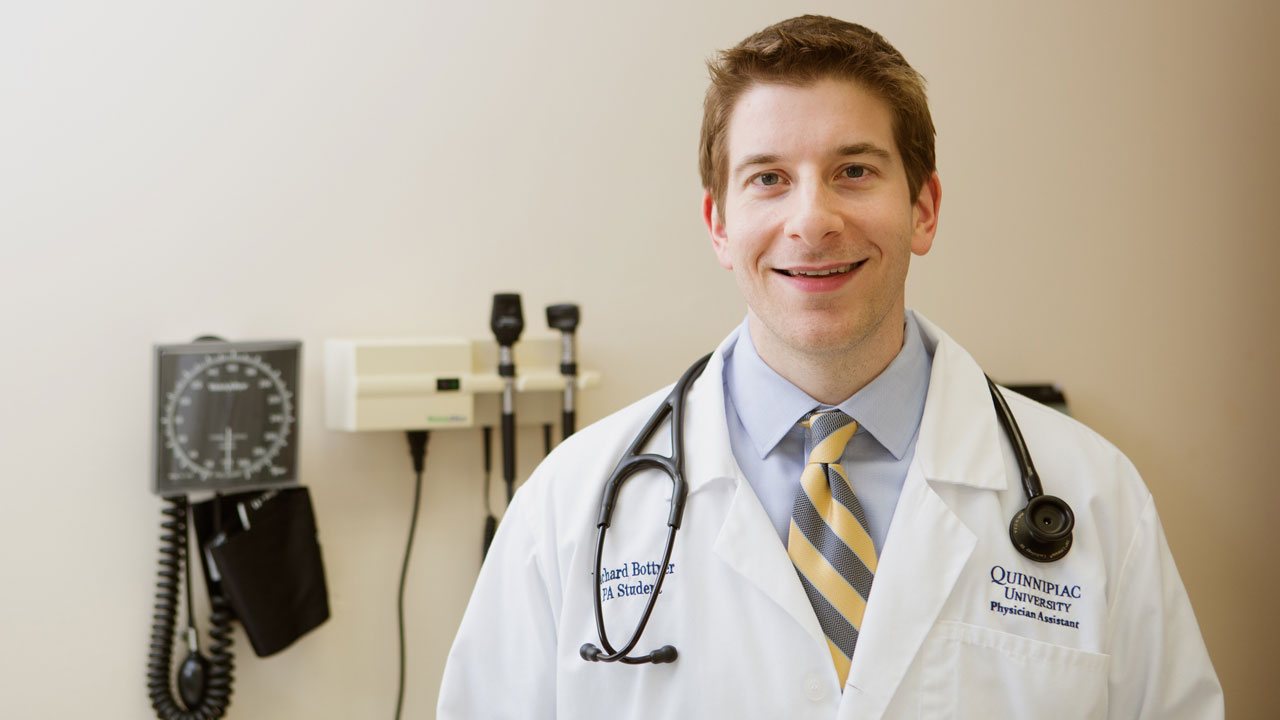[box]Richard Bottner, a Quinnipiac University physician assistant student, is an urban health scholar.[/box]
Eighteen Quinnipiac University students in the physician assistant program are spending the year improving the lives of the medically underserved, urban populations in Connecticut as urban health scholars.
Quinnipiac students are participants in the Urban Service Track program, a collaboration between the University of Connecticut and the Connecticut Area Health Education Center. Funded with federal and state grant money, the program provides primary care and health literacy education to urban communities in the state.
The Quinnipiac PA students, along with UCONN dentistry, medical, nursing, pharmacy and social work students, collaborate on interprofessional teams to provide direct patient care and expand their clinical knowledge. The students work in health centers and volunteer at community outreach events, such as health fairs, as well as visiting schools and senior centers to improve health literacy on a variety of topics, including smoking cessation, oral health and nutrition.
The program also features an educational component. The students attend retreats several times a year, each of which focuses on a topic related to community health such as homelessness, child abuse, HIV/AIDS and mental health. A professional from the field discusses the topic, then students break into small, interprofessional groups to review a case.
For example, one retreat focused on veterans and how the various health professions can better address their unique needs. Topics included substance abuse, Post Traumatic Stress Disorder (PTSD), and exposures to harmful chemicals. Veterans spoke to the group about their experiences in medical offices and how it could be improved.
“It’s very fulfilling and educational at the same time,” said Richard Bottner, a second-year PA student at Quinnipiac and Urban Health Scholar. “I’ve learned things about pharmacology and dentistry that I never would have known otherwise,” he said. The program “augments what you’re learning in the classroom and keeps your clinical skills sharp,” he said.
Bottner has completed more than 100 hours of community service while working toward his master’s degree. Quinnipiac’s PA program places a strong emphasis on service and health literacy and requires its students to complete at least 50 hours of service before graduating; however, most students far exceed that number.
By providing manpower for free community health centers, the program improves access to preventative screenings and other services for underserved populations. “We’re an army of free and accessible care,” Bottner said.
Classmate and fellow Urban Health Scholar Alyssa Kanagaki said the program has given her a broader view of the health field. “This is the model people should learn from because it’s real life. It’s invaluable to hear about the different lens a pharmacy student uses to look at a patient’s clinical situation versus a social worker student,” Kanagaki said.
“I work more confidently among teams because I have a better understanding of how pharmacists, dental students, nurses, doctors, and social workers play into patient care and try to view problems from their perspective. This is the future of learning,” she said.
